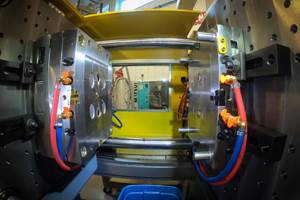Community Involvement Programs Reach Out to Residents and Encourage Workers
SPI believes that community involvement is a powerful tool that builds a reservoir of goodwill for a company at the local level and the industry as a whole.
The Society of the Plastics Industry, Inc. (SPI) believes community involvement is a good business decision for plastics companies. And our members' experiences prove us right every day.
Community involvement is a powerful tool that builds a reservoir of goodwill for a company at the local level and the industry as a whole. If it is done well, community outreach shows that a company is a good corporate citizen; helps it deal more effectively with its neighbors and policymakers; and assists it in addressing a critical industry issue - workforce development.
SPI's website contains dozens of its members' community involvement success stories. Following are some companies' outreach efforts.
- Landis Plastics (Chicago, IL) uses a variety of programs to change the negative views of plastics. Employee speakers at Cub Scout meetings, discussions between company engineers and local science teachers and information about the plastics industry provided to the local library are all part of Landis' community outreach programs, which have put the company face to face with local residents. Many of these efforts focus on children as a way to bring a lasting change in attitudes.
- Husky Injection Molding Systems' (Costa Mesa, CA) general manager Michael Smith uses his skills as a magician to educate children about the benefits of plastics and encourage his peers to spread the word. Though Smith uses smoke and mirrors to make his points, he says effective community outreach programs do not have to be elaborate. A company can donate pencils with its logo on them to local schools, write a letter to the editor correcting misinformation or provide its workers with positive responses to negative comments. All it takes is a plan, objectives and follow-through.
- Cowan Plastics' (Providence, RI) president Michael Marra helped develop programs to train workers for careers in plastics and encourage students to consider industry-related jobs - while boosting his company's image. For instance, as a result of his efforts and those of other local plastics companies, the Community College of Rhode Island began offering an associate's degree in plastics processing. Marra also developed shadowing and mentoring programs linking students with plastics industry employees and has offered plant tours to local teachers and counselors to introduce them to the benefits of plastics and industry careers.
- Prestige Mold, Inc. (Rancho Cucamonga, CA) where the late Mike Koebel played a major role in developing the moldmaker training program at Fontana High School and San Bernardino Community College. The first of its kind in the area, the effort included a hands-on moldmaking class at Fontana, an associate's degree program at the college and apprenticeship placement. Today, Koebel's wife Donna, CEO of Prestige, and Lance Spangler, its president, continue to support the program and encourage other companies to provide plant tours; talk to students; act as mentors; contribute materials, equipment or money, and develop their own programs.
- Jatco, Inc. (Union City, CA) where community involvement means community education. Through local first-graders hearing the word 'plastic' for the first time on a tour of the plant and high school students learning about career opportunities in the industry to college students enrolled in a plastics program underwritten by Jatco and company employees learning the importance of spreading a positive message about plastics, Jatco President Paul Appelblom gets involved in and educates his community. "In my opinion," Appelblom says, "we, as an industry, have an obligation to get out and discuss the importance of plastics with people, particularly young people."
- Stan Cast Moldmaking (Leominster, MA) has close community ties as a result of its strong support of local schools and events, and participation in local and state government. Now a firm believer in community outreach, Stan Cast president Dick Flannagan says he first became active in response to a problem: He needed more trained workers, so he got involved with the local vocational school. As a result, he was instrumental in developing plastics programs at two nearby colleges. And Stan Cast still works closely with local high school and college training programs. The company also encourages its employees to take active roles in the community.
- Imperial Custom Molding (Rogers, MN) where outreach programs have included bringing teachers into the workplace to get a firsthand look at the skills required for successful workers, presentations in classrooms and an apprenticeship program with the local vocational school. As a result of these and other efforts, says CEO Chuck Van Heel, Imperial has received favorable publicity as a good company that cares about its employees and its community. "The plastics industry is just too quiet and that makes it easy to criticize," according to Van Heel. Community involvement, he says, is a way in which a company can make itself heard.
Jump-start Your Own Community Involvement Program
Following are some ideas on how to jump-start or augment your own community involvement program:
- Participate in school career days.
- Develop a mentoring or shadowing program.
- Give presentations and materials on careers in plastics to school guidance counselors.
- Have a plant open house for parents to discuss careers in plastics.
- Buy an ad in a yearbook, school newspaper or sports program.
- Serve as guest lecturer at industry-related degree programs at local colleges.
- Encourage employees to talk to students about their careers in plastics. For the community:
- Get involved in the local Chamber of Commerce.
- Support your employees' community activities on company time.
- Give presentations to civic clubs and local youth organizations.
- Hold an annual open house and picnic for the community.
- Get involved with a Habitat for Humanity project.
- Get involved with a local economic development council.
- Join other local plastics companies to sponsor booths at state and county fairs.
For government:
- Invite local government officials to tour your plant.
- Write letters to government officials on plastics issues.
- Testify before state legislative committees/panels to support/ oppose legislation on behalf of the industry.
- Brief officials on the economic contributions of the plastics industry.
- Work with officials to develop training programs for local workers.
For the media:
- Invite members of the local news media to tour your plant.
- Provide local news media with information on company and industry developments and economic contributions.
- Offer to write a guest column in your local newspaper on industry developments or economic contributions.
- Write letters to the editor in response to articles and editorials that may misrepresent plastics, your company or the industry or commend a well-written article.
For employees:
- Encourage and support employee involvement in the community.
- Sponsor employee sports teams.
- Discuss community involvement at staff meetings.
- Publish stories in your company newsletter about employees involved in the community.
- Recycle bottles and cans in the employee lunchroom and donate proceeds to a local charity chosen by your employees.
- Publish industry information and developments in your employee newsletter.
For the environment:
- Provide a recycling drop-off center at your facility for residents and businesses that don't have access to recycling pickup.
- Provide educational materials on plastics and the environment to the community.
- Organize a park or beach clean-up.
- Get involved with Keep America Beautiful.
- Participate in local Earth Day activities.
- Help set up or participate in recycling programs.
For more information visit www.plasticsindustry.org, call Bonnie Merrill Limbach, SPI vice president of public affairs, at (202) 974-5210 or e-mail blimbach@socplas.org.
Related Content
Steps for Determining Better Mold Prices
Improving your mold pricing requires a deeper understanding of your business.
Read MoreEditorial Guidelines: Editorial Advisory Board
The Editorial Advisory Board of MoldMaking Technology is made up of authorities with expertise within their respective business, industry, technology and profession. Their role is to advise on timely issues, trends, advances in the field, offer editorial thought and direction, review and comment on specific articles and generally act as a sounding board and a conscience for the publication.
Read MorePredictive Manufacturing Moves Mold Builder into Advanced Medical Component Manufacturing
From a hot rod hobby, medical molds and shop performance to technology extremes, key relationships and a growth strategy, it’s obvious details matter at Eden Tool.
Read MoreHow to Improve Your Current Efficiency Rate
An alternative approach to taking on more EDM-intensive work when technology and personnel investment is not an option.
Read MoreRead Next
Are You a Moldmaker Considering 3D Printing? Consider the 3D Printing Workshop at NPE2024
Presentations will cover 3D printing for mold tooling, material innovation, product development, bridge production and full-scale, high-volume additive manufacturing.
Read MoreReasons to Use Fiber Lasers for Mold Cleaning
Fiber lasers offer a simplicity, speed, control and portability, minimizing mold cleaning risks.
Read MoreHow to Use Strategic Planning Tools, Data to Manage the Human Side of Business
Q&A with Marion Wells, MMT EAB member and founder of Human Asset Management.
Read More_970x90 1.png;maxWidth=970;quality=90)















_300x250 3.png;maxWidth=300;quality=90)



.png;maxWidth=300;quality=90)
.jpg;maxWidth=300;quality=90)








